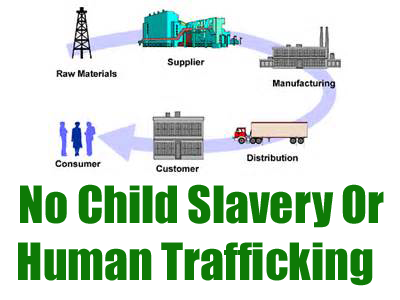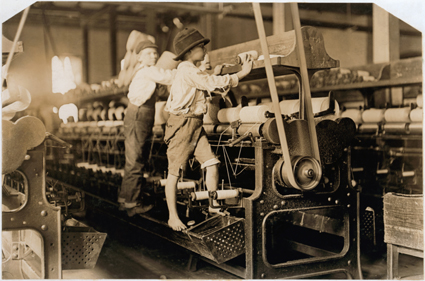Supply Chain Transparency: Apathy No More!
SUPPLY CHAIN TRANSPARENCY: APATHY NO MORE
~ ISSUE 201 ~ DECEMBER 15, 2015
By Diane Gold
 Supply chain transparency may seem a far cry from my usual nutrition, world peace and habit change. However, it is something most of us have developed a habit to ignore. Whether we purchase a product, locally or globally, do we think about how the product is made?
Supply chain transparency may seem a far cry from my usual nutrition, world peace and habit change. However, it is something most of us have developed a habit to ignore. Whether we purchase a product, locally or globally, do we think about how the product is made?
When there’s a rally because someone points out that children are used as inexpensive labor, we join the crowd. We use social proof – viewing the enthusiastic behavior of others – to follow the herd. Do we let this mentality reduce how conscientious we are as consumers or users of product?
BUYING UNETHICALLY SOURCED GOODS
I do think about how companies serve their labor. I often teach customer servants to think for themselves, rather than keep their minds closed to the lessons taught by their employer alone. But, what if we need something and don’t have time to be kind, thoughtful, ethical, moral, independent?
Take yesterday, when I put my own comfort ahead of a persona debate I have been having. My umbrella, given to me at some convention for some network marketing nutritional product I gave up because it wasn’t vegan, took a turn for the worse. It went from shielding me from raindrops to being more likely to poke me or someone else in the eye. So, on my way back from seeing a friend, I stopped into a giant retail store that had a reputation of having used child labor.
I purposefully and purposely have avoided the store because of media coverage of child labor. However, I had a need. And the almighty “I” had to be satisfied. So, I bought an umbrella. I truly was thinking that this multinational company must have cleaned up its act, or we would be hearing continued stories about it. Maybe it has. Maybe it hasn’t. I don’t feel clean for having purchased there.
I was going to write that I would return the umbrella, but it started to rain, and I used it. And that’s how it goes. We get ethical when it’s convenient for us. I have since researched sustainable umbrellas, and I returned the questionable umbrella, even though it might have rained.
CALIFORNIA SUPPLY CHAIN TRANSPARENCY
In 2010, California passed an act whereby, companies had to post certain details about their product chain by 2012. Although many have complied, some have not. Others, one of whom grows the fruit I might eat, say they are out of bounds of the act. Many companies have smaller divisions that are, themselves, incorporated. So, they do not fall into the financial sector required by the act.
The act requires that retail sellers or manufacturers that make over $100 Million dollars must post form an SB-657. Its purpose is to verify that human trafficking and slavery are not present in any part of the supply chain from which a product is made or from which gets it to market.
Each company that fills out the form (and we realize this leaves out loads of companies, but it’s a beginning) certifies that it:
1) Engages in verification of product supply chains to evaluate and address risks of human trafficking and slavery. The disclosure shall specify if the verification was not conducted by a third party.
2) Conducts audits of suppliers to evaluate supplier compliance with company standards for trafficking and slavery in supply chains. The disclosure shall specify if the verification was not an independent, unannounced audit.
3) Requires direct suppliers to certify that materials incorporated into the product comply with the laws regarding slavery and human trafficking of the country or countries in which they are doing business.
4) Maintains internal accountability standards and procedures for employees or contractors failing to meet company standards regarding slavery and trafficking.
5) Provides company employees and management, who have direct responsibility for supply chain management, training on human trafficking and slavery, particularly with respect to mitigating risks within the supply chains of products.
OUR ROLE
In reading the act, it makes me wonder why all companies in every state aren’t required, at least, do this much. It also makes me realize that we all have a role. It is our responsibility to think about ethics when we purchase. It is our responsibility to talk to others and ask what others are doing as consumers, producers and retailers. It is very nice to go march for awareness; it is better to take an ongoing active role.
It is best to lead by example. Buying an umbrella that was supplied by a company that has many divisions oversees brings to mind what supply chain transparency can avoid: humans forced to work in unseemly conditions. And makes me consider what other companies I support that do not treat workers fairly.
KNOWN OFFENDERS
Let me say first that I do not agree that we should be using meat, poultry, fish for food or product unless our environment does not support plant growth or our environment is so harsh that it would put our lives at risk to do so. But, here’s a reference to the Southeast Asian shrimp trade. According to much publicity, young people are kidnapped and brought onto fishing boats against their will and taken out to sea for several months. It is said they are given no wage, no time off, are beaten and abused. This is a story we know about. What if every other company from which we used goods or those whose goods our families used, at some point in the supply chain, used humanly trafficked slave labor?
The large multinational I mentioned earlier with the umbrella story and so many other manufacturers and retailers may think they know their supply chain. The people in direct contact with the sellers/manufacturers could be as ethical as could be. But, what if the next step in every chain violated these ethics?
CONCLUSION

Let’s hope that every state adopts a supply chain transparency act and that all companies are included. If small business is the way of the future, why would we not include all small business, no matter their economic size?
ACTION STEPS
1) To be ethical is to develop the habit of considering supply chain before we buy. Even if it means giving up something we love, it would make a statement. If it’s so important to us to buy a particular item, write to the seller/manufacturer saying you will be waiting until the supply chain is fixed or verified before continuing to buy.
2) Think of one product you use that could use child/slave labor for production, and change retailers/manufacturers. If one doesn’t exist or it’s too expensive, eliminate the need.
3) Have one discussion with one friend, group or family members about the importance of being diligent in making purchases.
We can only do so much. We may not have the funding to cut out everything, but we can certainly keep it at the top of our minds.
![]()
If you wish to share your story, please hit reply in your email program to be contacted.
If you need habit help, go to warriorsofweight-consulting.
![]()
FEEDBACK
We value your feedback very much.
Please leave a comment below.
Please LIKE us on the website and at
WarriorsOfWeight on Facebook.
You can also follow us on Twitter @warriorsoweight.
Thanks.
![]()
DIANE GOLD, PUBLISHER AND AUTHOR
Diane Gold, Founder of Warriors of Weight, Turning Habits Into Health, is a mentor in tai chi, kung fu and meditation, a music, fitness and stress expert, dedicated mom, studying peaceful conflict resolution, habit replacement and certified in plant-based nutrition.
She believes in facing it. She says,
“If we want not to think about what we cause, that’s our choice.
“I do want to face what I do, cause, effect, help, hurt. Imagine my surprise when I realized that most of the clothes in my closet were made from genetically modified cotton, possibly sourced from child labor. And the bedding on which I sleep, although cotton, is also GMO. since it would have cost me double to get organic, which would, by requirement, eliminate genetic modification.
“Let’s face it, whatever it is. Let’s stand, sit, lie, whatever we can do, face to face with ourselves. If we decide we are caring individuals, and most of us are; let’s consider choosing to become aware of how we get a supply. My telling the world that my $100 Million Dollar company (CA requirement for transparency) does its best not to use supplies or suppliers that deal in slavery or human trafficking. If we had to take out an ad in The New York Times confessing that we used vendors who deal in slavery and human trafficking every time we were caught, it might be more impactful. I would certainly like that more.
“Let’s be aware. Let’s do something, and let’s keep it up. Once is great, but continuity is best. In my eyes, we are our sisters’ keeper.
“And, finally, let’s take overall good care of ourselves because we are so worth it.”
![]()







